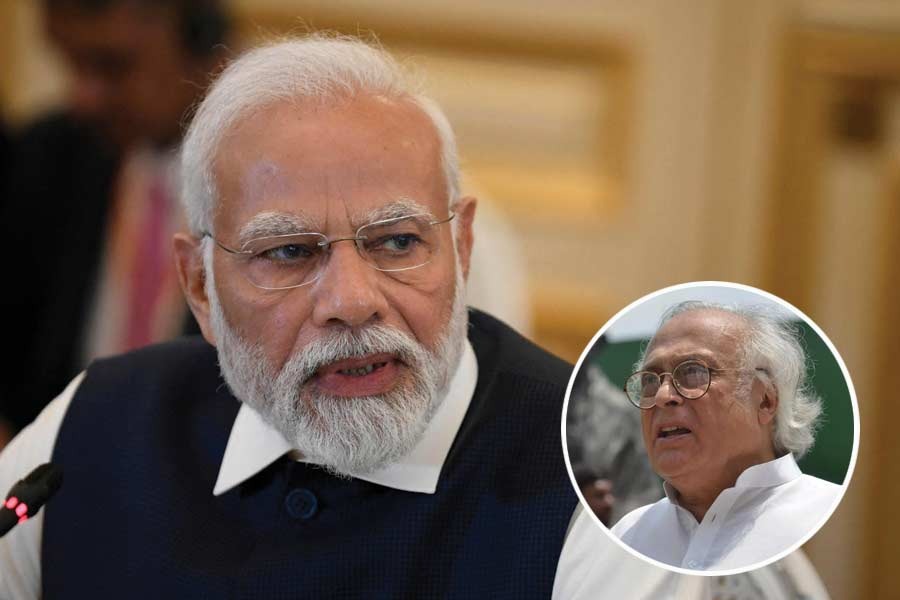The Congress on Sunday asked why consumers were not given the benefit when prices of crude oil fell in the international market over the past year.
The question acquired a gut-wrenching human dimension against the backdrop of a stoic vegetable vendor being overwhelmed and choking up when asked why he is returning with an empty cart from a wholesale market in Delhi.
The Congress accused the “cruel” Narendra Modi government of “indulging in profiteering”, seeking to prick the bubble at a time the Prime Minister is hard-selling a “promise” to make India the third-largest economy in the world.
Congress communications chief Jairam Ramesh said: “The people of the country are grappling with economic distress because of high prices and unemployment. But the BJP government is busy looting the hard-earned money of the people.
The prices of crude oil have come down by at least 35 per cent in the past one year, but the cruel Modi government is indulging in profiteering by levying high taxes on petroleum products.”
Ramesh explained: “It is not only profiteering by the government. Even private companies have made money as the government pursues a policy of committing dacoity on the people’s earnings. The oil companies are earning a profit of more than Rs 10 per litre on petrol and diesel. According to a Crisil report, the three government oil companies — IOC, BPCL and HPCL — have earned an operating profit of more than Rs 1 lakh crore in the current financial year. This is three times the profit of last year.”
The average crude oil price in the Modi regime has been less than $65 per barrel although international prices are showing an upward trend now, but it sold petrol for around Rs 100 a litre and diesel above Rs 90 a litre. While the excise duty in 2014 was Rs 9.20 a litre on petrol and Rs 3.46 a litre on diesel, the Modi government is extracting Rs 19.90 on petrol and Rs 15.80 on diesel.
Ramesh said the Modi government had earned Rs 32 lakh crore from high taxes on petrol and diesel in the past nine years. “This loot has come at a time when the Modi government has thrown the country into the inferno of high prices of essential commodities, including vegetables, fruits, pulses, spices, edible oil and other items,” the Congress leader said.
Prices have been tormenting people for long, with tomato shooting to Rs 200 a kg this month. Both Rahul Gandhi and Priyanka Gandhi Vadra tweeted a few days ago a video clip of the vendor who cannot afford to source vegetables from the wholesale market. Neither is he sure if he will be able to find buyers when vegetables are so expensive. The vendor living in Delhi said while his house rent alone was Rs 4,000 a month, there was no certainty of earning even Rs 100 a day.
The video went viral on social media when Modi was making much-vaunted claims of making India the third-largest economy in the world in his third term. “This is my personal guarantee,” Modi said.
Modi had made similar noise in 2019 about turning India into a $5-trillion economy by 2024. Former Prime Minister Manmohan Singh had been ridiculed by Modi’s supporters when he expressed doubts about reaching the $5-trillion target by 2024.
India’s GDP today stands at $3.3 trillion. Global agencies have projected India’s GDP to reach $4 trillion by 2027 and $6 trillion by 2030. Modi now never talks about high prices and unemployment and doesn’t mention the $5-trillion target for 2024.
Most of the promises made in 2014 also remain unfulfilled and forgotten. While the suggestion of Rs 15 lakh in every account was dubbed “jumla (rhetoric)” by Amit Shah, Modi no longer mentions two crore jobs every year, doubling of farmers’ income, or pucca house to every family by 2022. Women’s safety and the promise of “achchhe din” also seem a far cry, with Modi moving on to India becoming the third largest economy in his third term, which is yet to be won. Ramesh commented on this, saying:
“According to the World Bank, based on purchasing power parity data, the Indian economy stood at number 10 in the world in 2005. By 2011, it had become the world’s third-largest economy. Dr Manmohan Singh never boasted during his second term that this was achieved only because of him. Of course, it would be too much to expect the self-styled Vishwaguru to acknowledge this even though some of his professional drumbeaters would surely have known about it.”
Even though India is among the top five countries in terms of GDP value, it lags behind when it comes to per-capita income, which is less than the average of lower-middle-income countries. India’s per-capita income is $2,388, lower than Bangladesh whose figure is $2,688. The average for lower-middle-income countries is $2,542.











